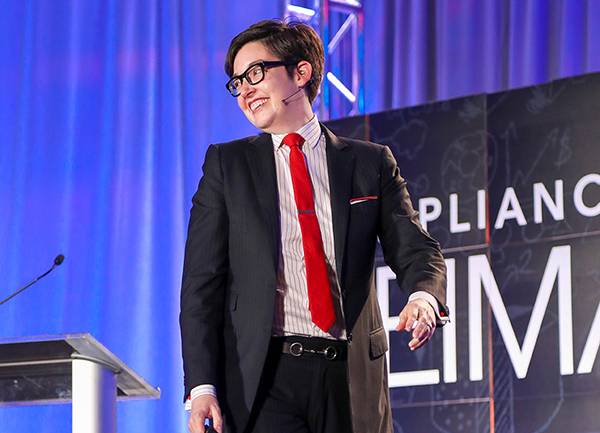You are here
Q&A With New Board Member Vanessa Benavides
Vanessa M. Benavides, senior vice president and chief compliance and privacy officer for Kaiser Foundation Health Plan, Inc. and Kaiser Foundation Hospitals, has been elected to the CDC Foundation board of directors. Vanessa is a respected leader in the healthcare industry. She is a member of the board of directors of The Trevor Project, the leading national organization providing crisis intervention and suicide prevention services to LGBTQ youth. Vanessa also served on the national board of directors of the Human Rights Campaign.
Tell us about your role as senior vice president and chief compliance and privacy officer for Kaiser Foundation Hospitals and Health Plan. What does your job entail, and what led you down this path?
I have spent my career working in the health care industry, primarily as a regulatory lawyer and compliance officer in large, for-profit companies. Reputation is what attracted me to Kaiser Permanente almost four years ago. I wasn’t looking for a new job when I received a call from a recruiter. I was happy and successful right where I was. I took the call because it was Kaiser Permanente, an organization that, in my mind, had a reputation for being inclusive and led by innovators who were achieving great quality outcomes for their members and patients while shaping the national conversation about total health. Had it not been for that reputation, I likely would not have entertained the call. I see my role as Chief Compliance Officer, primarily, as a steward of that reputation.
Healthcare is a high-trust industry, and trust is crucial to our ability to achieve our mission to provide high-quality, affordable health care services and to improve the health of our members and the communities we serve. As a healthcare organization, we are entrusted to take care of people at some of their most vulnerable times. In order for us to do our jobs well, our members and patients have to feel safe sharing themselves with us. They have to trust us with their sensitive health data, their financial information, and quite literally their wellbeing. They must trust we hold their best interests as our top priority in everything we do.
Coming out of law school, I never thought I would be a chief compliance officer. I was drawn to it because of the opportunity the role provides to make a bigger impact. While my legal background serves me well in my role, my compliance focus allows me to see across the organization in a systematic manner that has a greater ability to impact the culture and the overall value proposition that the organization brings to our members and communities.
What drew you to serve on the CDC Foundation board of directors?
I believe strongly in contributing to charitable organizations, and board service has always been a method of contribution I enjoy. I am drawn to organizations led by purpose-driven leaders, tackling significant issues and making meaningful impacts. The CDC Foundation easily fits these criteria. The vast scope of work as well as the deep strategic knowledge throughout the organization is impressive. I’m really excited to join my fellow board members in supporting the innovative work and impact the Foundation delivers.
What inspires your commitment to improving public health?
I believe everyone has the right to be healthy, and everyone should have equal access to fulfilling that right. Health is greatly impacted by the various communities in which we live our lives—home, work, school, etc. Because of that fact, our health is far too influenced by the inequities that befall these communities. Public health work has a vast purview, seeking to assure the conditions in which people can be healthy. This includes everything from healthy lifestyle promotion to disease detection, prevention and response, to research on injury prevention. Whether it’s through research, direct services, policy recommendations, or educational programs, public health initiatives promote equity and accessibility to our fundamental right to live healthy lives.
What do you think is the biggest issue/challenge facing public health today? What about biggest opportunities to improve health?
It’s difficult to narrow it down to one issue, but I would have to say climate health, or the health of our planet, is very high on my list of biggest public health issues. It is impossible to have healthy communities if we don’t have clean air and water, adequate food supplies, and temperatures that support a healthy and stable climate. Significant disagreement about the issue, coupled with a relatively short time horizon to shift policies and human behaviors, exacerbates the challenge and makes it tougher to find large-scale solutions.
On the flip side, I think one of the biggest opportunities to improve health is awareness of the issues and awareness of our collective ability to make a meaningful impact—through our own behavior changes, advocating for policy solutions, and simply caring enough about our communities to engage in the issues.
In your view, what is the role of public-private partnerships in improving health?
Together, government and private entities make up the fabric of most every community. Public and private entities occupy unique spaces in society, serve distinct purposes, and carry their own potential for adding value to communities and the people living there. As a result, public-private partnerships have the ability to bring to bear the best of both worlds in addressing today’s biggest health challenges. We need organizations that are concerned with equity, addressing the needs of marginalized people, underserved communities and emerging social concerns just as we need continuous improvement, disruptive innovation, and access to capital. Public-private partnerships harness the power of aligned intentions in order to get more done together.
Who are some of your health heroes, and why?
Kaiser Permanente’s focus on addressing the social determinants of health is one of our priorities that I am most proud of, as it parallels my own interest in this area. Dr. Teletia Taylor of Howard University has led important research in this space, having identified the connection between women who face racial discrimination and increased incidence of breast cancer, one of the top three killers of black women in the United States.
Additionally, my role at Kaiser Permanente affords me the opportunity to see first-hand the heroics of researchers, front-line clinicians, nurses, and others—our colleagues who may not be well-known, but who are positively impacting the lives of countless members and patients every single day.

